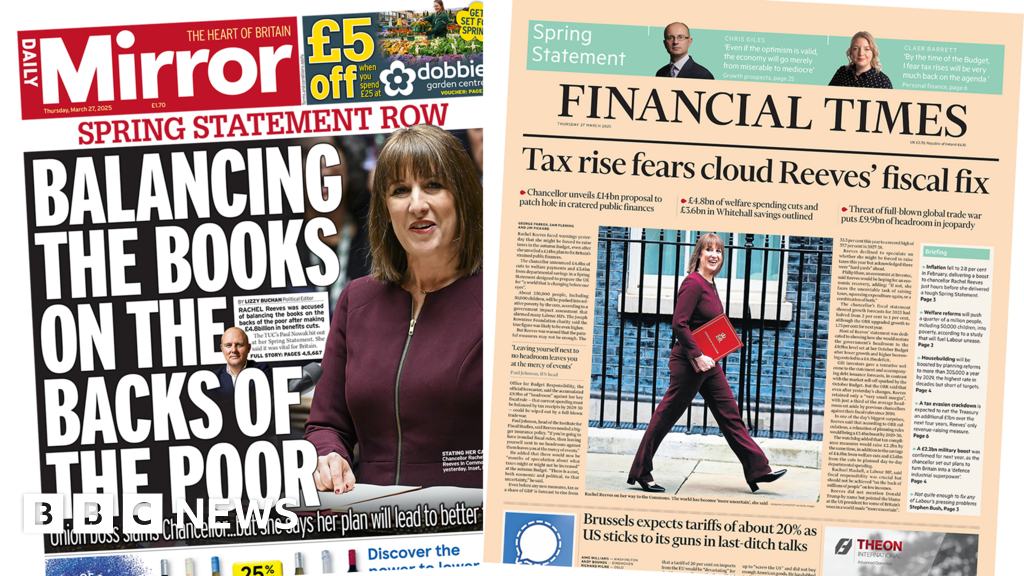**"Balancing the Books on the Backs of the Poor": Examining Austerity Measures and Public Backlash**
The recent announcement of billions in government spending cuts, coupled with grim economic forecasts, has sparked fierce debate across the UK. Headlines like "Balancing the books on backs of poor" and "Tax rise fears" (BBC.com) reflect widespread concern over who will bear the brunt of fiscal tightening. As the chancellor unveils austerity measures aimed at stabilizing public finances, critics argue that the most vulnerable populations are disproportionately affected. This article explores the implications of these policies, public reaction, and whether alternative solutions could achieve economic stability without deepening inequality.
The Chancellor’s Austerity Plan: Key Measures
The government’s latest budget proposal includes deep spending cuts across public services, welfare reductions, and potential tax hikes. Key measures include: - Reductions in welfare support – Cuts to Universal Credit and housing benefits. - Public sector spending freezes – Limited funding for healthcare, education, and local councils. - Increased indirect taxes – Higher VAT or duties on essentials, disproportionately affecting low-income households.

Caption: Newspaper headlines highlight public concern over austerity measures and tax increases. (Source: BBC.com) Proponents argue these steps are necessary to control inflation and reduce national debt. However, opponents claim they risk pushing more families into poverty while failing to address structural economic issues.
Who Bears the Burden? The Inequality Debate
Critics argue that austerity measures often fall hardest on those least able to absorb financial shocks. Research from the Institute for Fiscal Studies (IFS) suggests that: - Low-income households spend a higher proportion of earnings on essentials, making them more vulnerable to benefit cuts and indirect tax hikes. - Public service reductions—such as fewer social care provisions or longer NHS waiting times—disproportionately affect disadvantaged communities. For example, a single parent relying on Universal Credit could lose hundreds of pounds annually, forcing impossible choices between heating and food. Meanwhile, wealthier individuals may see minimal impact from indirect taxes due to higher disposable incomes.
Public Reaction: Protests and Political Fallout
The announcement has triggered protests from advocacy groups, unions, and opposition parties. Key reactions include: - Trade unions warn of strikes if public sector wages stagnate further. - Charities highlight rising food bank usage as evidence of growing hardship. - Opposition leaders accuse the government of "economic mismanagement," arguing that austerity stifles growth rather than fostering recovery. Public sentiment appears divided. While some support fiscal restraint to curb inflation, others believe the government is prioritizing debt reduction over social welfare.
Alternative Approaches: Is There a Better Way?
Economists propose several alternatives to blunt austerity: 1. Wealth and windfall taxes – Targeting corporations with record profits or high-net-worth individuals. 2. Progressive taxation – Higher rates for top earners rather than flat consumption taxes. 3. Strategic investment – Boosting growth through infrastructure and green energy projects to increase long-term revenue. Countries like Norway and Denmark have combined fiscal responsibility with strong social safety nets, suggesting that austerity isn’t the only path to stability.
Conclusion: A Delicate Balancing Act
The chancellor’s austerity measures aim to restore economic stability, but at what cost? While reducing debt is crucial, doing so through cuts that deepen inequality risks long-term social and economic damage. Policymakers must weigh short-term fiscal gains against the human impact—ensuring that "balancing the books" doesn’t come at the expense of society’s most vulnerable. As debates rage on, one thing is clear: sustainable economic policy must balance fiscal responsibility with fairness. The coming months will reveal whether the government’s approach leads to recovery or further hardship.